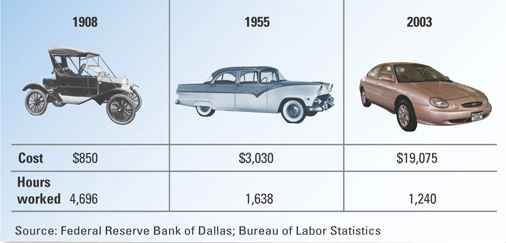Section 2 Inflation
Preview
Objectives
After studying this section you will be able to:
- Explain the effects of rising prices.
- Understand the use of price indexes to compare changes in prices over time.
- Identify the causes and effects of inflation.
- Describe recent trends in the inflation rate.
Section Focus
Economists use indexes to keep track of rising prices and to calculate the inflation rate. The level of inflation in the economy can affect wages, purchasing power, and other aspects of everyday life.
Key Terms
- inflation
- purchasing power
- price index
- Consumer Price Index (CPI)
- market basket
- inflation rate
- core inflation rate
- hyperinflation
- quantity theory
- demand-pull theory
- cost-push theory
- wage-price spiral
- fixed income
- deflation
You may have heard your grandparents or other relatives talk about the “good old days,” when you could get an ice cream for a nickel or a movie ticket for a quarter. They aren't kidding. Prices really were much lower years ago. On the other hand, although prices have generally risen, wages have risen, too. If you asked your older relatives how much they earned when they were young, you might find that it was difficult to scrape up that quarter for the movie ticket. In this section, you will learn why prices have risen, how economists measure their rise, and the effects of rising prices across the economy.

Image Long Description
Figure 13.3 Effect of Inflation on Auto Prices
Source: Federal Reserve Bank of Dallas; Bureau of Labor Statistics
The Effects of Rising Prices
Josephine and Jack Barrow have owned the same house for 50 years. Recently, they had a real estate agent estimate the house's present market value. The Barrows were astounded. They had bought the house for $12,000, and now it was worth nearly $150,000—a rise in value of more than 1,100 percent.
How could the value of a house, or anything else, increase so much? The main reason is inflation. Inflation is a general increase in prices. Over the years prices rise and fall, but in the American economy, they have mostly risen. Since World War II, real estate prices have risen greatly.
The Barrows were pleased that they could get so much money for their house. They also realized that they could not buy a similar house in their area for $12,000 or even $120,000. Inflation had raised the prices of all houses, just as it had also raised wages and the price of most other goods and services.




